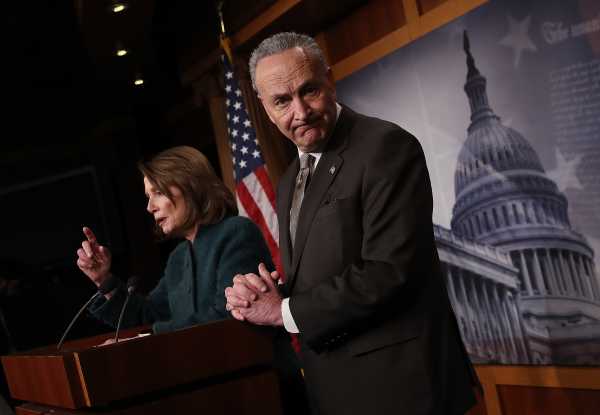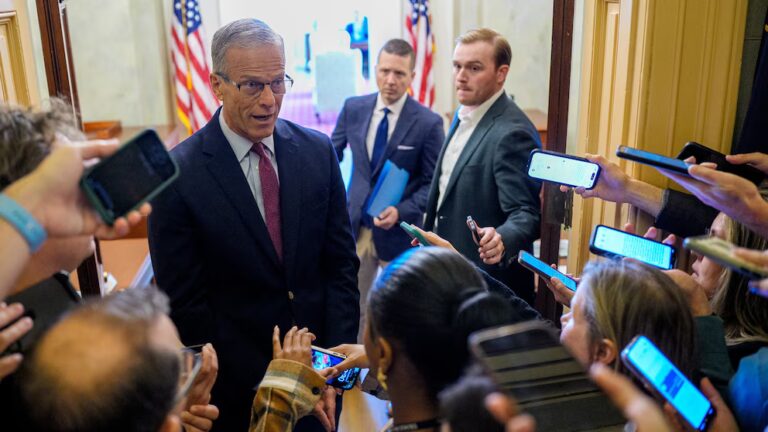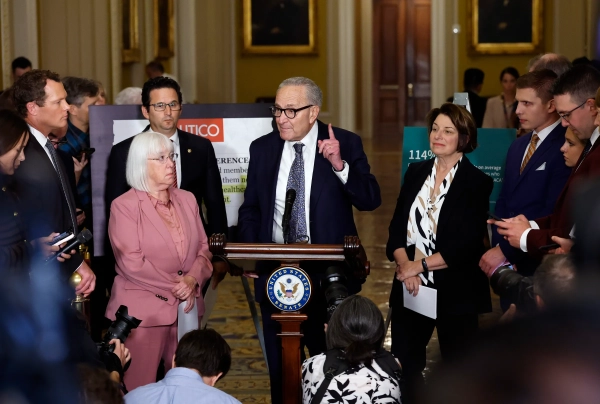
President Donald Trump’s infrastructure trap is back, and for the new House Democratic majority to succeed, they need to escape it.
It’s forgotten now, but in the transition winter of 2016-’17, a shockingly large and diverse set of congressional Democrats — from both the progressive and moderate wings of the party and including some key leaders — spent enormous time and energy making friendly noises toward Trump and suggesting that the result of his election should be some kind of bipartisan infrastructure deal.
The early energy of the resistance in halting Travel Ban 1.0 and organizing the record-shattering Women’s Marches helped slow the momentum of this idea, and then Trump rapidly fell into the clutches of congressional Republicans’ hard-right agenda. He continued to tout vaporware infrastructure plans, only to eventually come up with a scheme to make grants stingier and privatize some airports, which went nowhere.
But with Democrats now running the House of Representatives, infrastructure is back. And Trumpworld figures, looking at the polls, maybe Trump and the Democrats should come together around a random debt-financed increase in infrastructure spending that lets Trump regain his reputation as a dealmaker and lets Democrats say they accomplished something.
At his bizarre, rambling post-election press conference Wednesday morning, Trump went back to this and floated the idea of an infrastructure deal several times.
Since Trump is not very subtle, his team even explicitly told a group of Washington Post reporters that the infrastructure dangle is a trap designed to weaken Democrats’ political position. But in case anyone doesn’t get the message: This is a trap designed to weaken Democrats’ political position.
Trump is corrupt, racist, relentlessly dishonest, and a veteran con artist. Democrats of course can’t categorically rule out the possibility of doing a legislative deal with him. But you also don’t trade away the rule of law and the basic integrity of the American government for the sake of some pork barrel spending.
Get off the highway to Trump
It’s important to be clear on the risk here, which is very real.
The good news for liberals about Democrats winning the House this week is that it means the Republican Party’s hideously unpopular economic policy agenda is dead.
But the bad news for liberals is that with the Republican Party’s hideously unpopular economic policy agenda dead, the odds rise that Trump will be able to successfully secure reelection in key Midwestern swing states by waging a campaign based exclusively on racial fearmongering and culture war noise.
Making a bipartisan infrastructure bill the signature legislative achievement of the 116th Congress would be a big help in that strategy. Congressional Democrats could, in theory, vote for a big grab bag of random projects that lets each of them deliver some picayune benefit to their local constituents while allowing Trump to spend the next two years on an endless national tour of ribbon-cutting ceremonies. At each stop, Trump would lie relentlessly about the merits of the project, lie relentlessly about the degree of personal credit he deserves for it, slander his political enemies, stoke the fires of racial resentment, and obtain large amounts of largely uncritical local media coverage.
After Trump signed a bipartisan opioid bill in October, he spent the final weeks of the fall campaign touring red states to lie and say that Democrats opposed the bill.
That’s the basic reality Democrats need to get through their heads when thinking about the politics of a legislative compromise with Trump — he will lie about Democrats regardless of what they do, those lies will be echoed and amplified by Fox News and Sinclair Broadcast stations and Rush Limbaugh, and the mainstream press will be at best ineffectual in pushing back and in most cases will simply pass on the lies.
And Trump himself will achieve big political gains — a range of politicians from Franklin Roosevelt to Adolf Hitler obtained political benefits from high-visibility public works programs, and opposition legislators should be extremely reluctant to do Trump that favor.
Democrats need a visionary strategy
That said, Democrats also can’t afford to let Trump tour the country complaining that all Democrats want to do is investigate him while he is trying to fix the country’s infrastructure.
Real-world infrastructure legislation and infrastructure projects involve some difficult trade-offs about money, priorities, project selection, etc., but a purely rhetorical “infrastructure plan” can be all things to all people. Trump has no demonstrated understanding of infrastructure policy, but he is a decent liar, and his dissembling is echoed by a large and well-financed propaganda machine.
This requires Democrats to come up with a plan that is striking and visionary enough that normal people stand a chance of actually hearing about and understanding it. But it needs to also be genuinely transformative in a way that would make it legitimately worth doing on the off-chance that Trump somehow decides to agree to it.
Handing Trump a bipartisan legislative victory is too high a price to pay for a $1 trillion worth of pork barrel spending on random highway interchanges and road-widening projects, in other words, but the country (and the world) really does need a transformative infrastructure plan. If Trump is desperate enough for a deal, maybe he’d go for it.
But the key is to put ideas on the table that would genuinely alarm the conservative movement — and, more important, the corporate interests who stand behind it — and force Trump to make a serious choice about breaking with the plutocrats who prop up his regime or clearly standing in the way of an infrastructure transformation.
That means massive investments in clean energy generation and transmission, municipal broadband, a serious revival of airline competition, and competitive grants to states for carbon-cutting transportation programs.
If Trump signed a law that took on corporate America’s sacred cows and drastically improved the lives of millions of Americans, it would benefit him politically but would do so in a way that’s actually deserved and worthwhile for everyone around. Just pumping up the dollar signs around America’s existing largely dysfunctional system for transportation spending is another kettle of fish entirely.
A moment for boldness
Trump, according to the Post, “believes he can pit Pelosi and others who are interested in making deals with him on policies like infrastructure spending against those who rose to office intent on blocking his agenda and, perhaps, beginning impeachment proceedings.”
This is, I think, a serious misreading of Pelosi, who is a shrewd legislative tactician with almost no demonstrated interest in infrastructure policy.
The real risk is the opposite, that too many of Pelosi’s freshman members — often, by their nature, holding more tenuous seats — will feel pressure to say they came to Washington and got something done by making a cheap sale. Another potential problem comes in the Senate, where the Democratic caucus continues to have members from very Trumpy states, and where Chuck Schumer has in the past shown a weakness for dubious bipartisan infrastructure schemes.
At the moment, Senate Democrats’ current negotiating posture is that they want a $1 trillion infrastructure plan paid for by rolling back Trump’s tax cuts. Trump obviously isn’t going to go for that, but Democrats need to ask themselves what their response would be if he proposed doing the spending and just not offsetting it.
Are they comfortable opposing an infrastructure bill on the grounds that it doesn’t raise taxes enough? Are they comfortable with a world in which Trump gets to take credit for a debt-fueled, highly stimulative binge of infrastructure projects as he runs for reelection?
Neither is a very appealing political or substantive place for the opposition party to land, because the core problem with the bill Democrats have brought forward is that the infrastructure side of it is too much of a random grab bag rather than a genuinely meritorious agenda that would be worth fighting for or capable of capturing the public imagination.
Senate Democrats have, however, long been in a difficult tactical situation, torn between a large parcel of members who’d like to run for president in 2020 and another large parcel of members trying to win races in states Trump won. Those tensions will be somewhat muted now that the midterms are over, but it remains fundamentally true that the Senate caucus is poorly positioned to stake out a clear positive agenda.
But the resistance movement that won the House majority got its start by pushing Democrats on Capitol Hill out of Trump’s infrastructure trap, and it’s the House that will now be the core of official resistance to Trump. And priority No. 1 for that congressional resistance should be developing a strategy to counter Trump on infrastructure.
Sourse: vox.com






